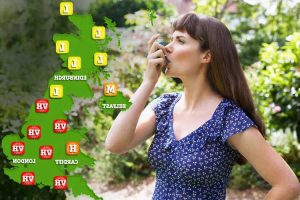Soaring pollen levels and storms threaten ‘toxic cocktail’ for millions with hay fever, experts warn

SOARING pollen levels across the UK combined with storms could create a toxic cocktail for millions of Brits suffering from hay fever, experts warn.
Storms are forecast for Thursday and the Met Office states that pollen counts across the country are at "very high levels".
This combination, expert warn, could be deadly for people suffering with asthma and hay fever.
Jessica Kirby, Head of Health Advice at Asthma UK and the British Lung Foundation said people who have asthma should make sure they are prepared over the coming datys.
She explained: "This week’s toxic cocktail of high pollen levels, warm weather and thunderstorms poses a triple threat for people with asthma, putting them at greater risk of having a life-threatening asthma attack.
"Over three million people with asthma are affected by pollen which can inflame their airways and trigger their asthma symptoms."
According to Asthma UK Asthma UK around 58 per cent of people with asthma say that pollen is a trigger for them.
More than 10 million people in England suffer from hay fever, and around eight million people have asthma.
Forecasts from the Met Office state that today, pollen levels are "very high" in the South, the Midlands, the North West and North East with just Scottish areas remaining at low pollen levels.
Levels remain high through to the weekend and Jessica said that stormy weather can make this even worse.
"It breaks the pollen into much smaller particles, which are then inhaled more deeply into the lungs.", she said.
Monday marked the hottest day of the year so far, with temperatures soaring to 29.7C in Teddington, Middlesex, and Met Office meteorologists have said Wednesday could be even warmer in the south.
Today has been cloudy but still warm with south-east England seeing the highest temperatures of 24C to 25C – but the mercury will soar again tomorrow.
The Met Office has issued yellow weather warnings for the storms which could cause flooding and power cuts from 6pm on Wednesday until 6am on Friday.
Warnings cover areas south of Newcastle with the exception of the western edge of England and Wales, and Northern Ireland.
In order to reduce the risk of having a serious asthma attack, Jessica said that people who have asthma that is triggered by pollen should take their preventer inhaler every day, as prescribed, alongside their usual hay fever medicines, to reduce the risk of hay fever triggering an asthma attack.
"This reduces sensitivity and swelling in the airways, helping to prevent asthma symptoms such as wheezing and coughing before they even start.
“We also advise people to carry their reliever inhaler (usually blue) with them every day, especially when they are out and about enjoying the sunshine, in case pollen does trigger their asthma. Reliever inhalers quickly relax the muscles in the airways and ease symptoms on the spot", she said.
If you have asthma there are ways you can reduce the risk of hay fever triggering an asthma attack.
You can try blitzing symptoms with antihistamines and/or a steroid nasal spray.
There are lots of different medicine options for hay fever and your pharmacist can help you decide what to try, Jessica said.
Source: Read Full Article



